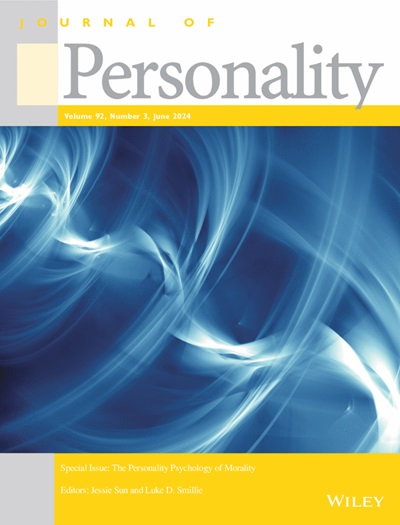育龄期生育预期的五大人格特征和轨迹。
IF 2.7
1区 心理学
Q1 Psychology
引用次数: 0
摘要
目的近几十年来,选择自由的增加和生育调控的进步使个体能够遵循不同的生育路径。这种更大的自主权为塑造长期生育预期的人格特征提供了空间,而这反过来又可以预测生育结果。本研究调查了五大人格特征与生育预期轨迹和结果的关系。方法在研究开始时,我们使用了具有代表性的荷兰样本(N = 5231)。我们研究了18-49岁人群的生育预期(即,你认为你将来会有孩子吗?)的发展。我们进行了联合潜在分类分析。结果对为人父母有稳定期望的学生占比最大。然而,大多数人偏离了这一轨迹。所确定的阶层在成为父母或不成为父母的可能性上有所不同。对为人父母有稳定期望的男性和女性在宜人性和外向性方面得分更高。此外,与其他班级相比,男性在责任心和开放性方面得分更高,而在神经质方面得分较低。结论不同育龄人群生育预期轨迹存在较大差异。尤其是男性,五大人格特征与生育预期轨迹有关。本文章由计算机程序翻译,如有差异,请以英文原文为准。
Big Five Personality Traits and Trajectories of Fertility Expectations Across the Reproductive Age Period.
OBJECTIVE
In recent decades, increased freedom of choice and advancements in fertility regulation have allowed individuals to follow different fertility paths. This greater autonomy provides room for personality traits to shape long-term fertility expectations, which in turn can be predictive of fertility outcomes. The present study investigates how Big Five personality traits are related to fertility expectations trajectories and outcomes.
METHOD
We used a representative Dutch sample who was non-parents at the start of the study (N = 5231). We explored the development of fertility expectations (i.e., Do you think you will have children in the future?) across ages 18-49. We conducted joint latent class analyses.
RESULTS
Having a stable expectation to become a parent was the largest class. However, the majority deviated from this trajectory. The identified classes varied in their probability of becoming a parent or not. Men and women who had stable parenthood expectations scored higher on agreeableness and extraversion. Additionally, men scored higher on conscientiousness and openness, and lower on neuroticism compared to some of the other classes.
CONCLUSIONS
People show substantial variation in their fertility expectation trajectories across reproductive age. Especially in men, Big Five personality traits are related to fertility expectations trajectories.
求助全文
通过发布文献求助,成功后即可免费获取论文全文。
去求助
来源期刊

Journal of Personality
PSYCHOLOGY, SOCIAL-
CiteScore
9.60
自引率
6.00%
发文量
100
期刊介绍:
Journal of Personality publishes scientific investigations in the field of personality. It focuses particularly on personality and behavior dynamics, personality development, and individual differences in the cognitive, affective, and interpersonal domains. The journal reflects and stimulates interest in the growth of new theoretical and methodological approaches in personality psychology.
 求助内容:
求助内容: 应助结果提醒方式:
应助结果提醒方式:


